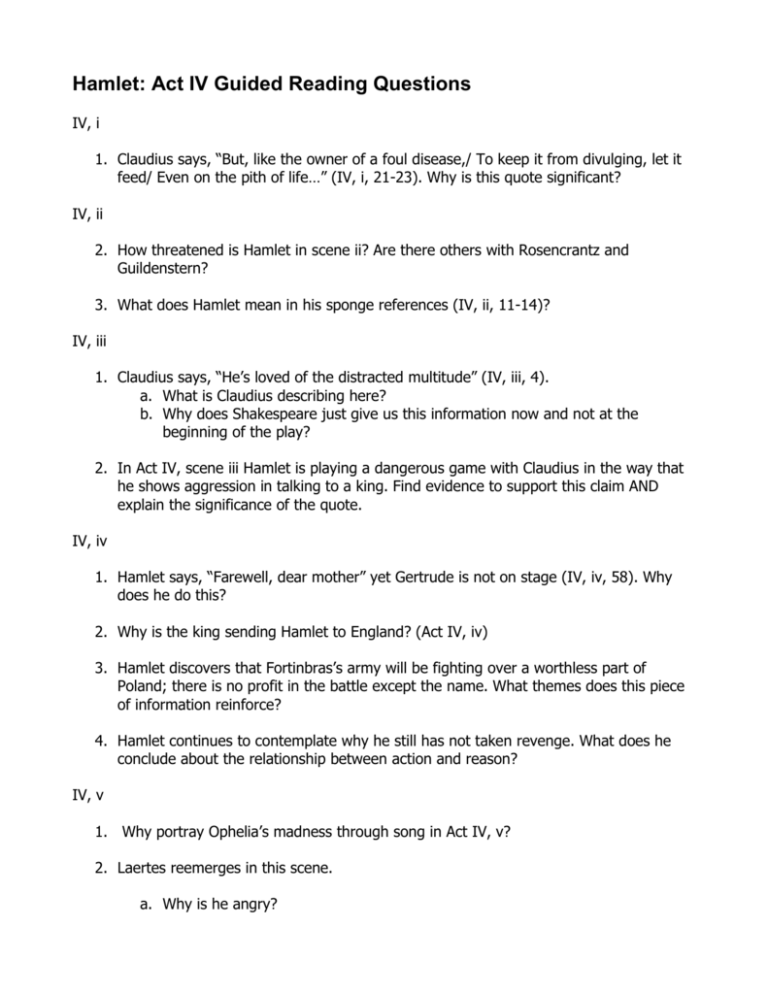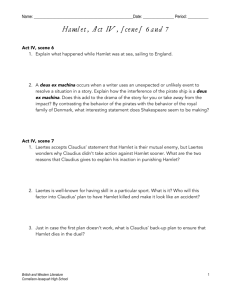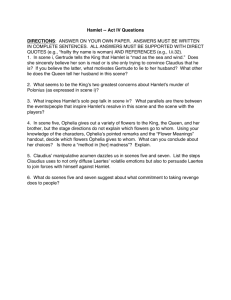Hamlet Act IV: Guided Reading Questions
advertisement

Hamlet: Act IV Guided Reading Questions IV, i 1. Claudius says, “But, like the owner of a foul disease,/ To keep it from divulging, let it feed/ Even on the pith of life…” (IV, i, 21-23). Why is this quote significant? IV, ii 2. How threatened is Hamlet in scene ii? Are there others with Rosencrantz and Guildenstern? 3. What does Hamlet mean in his sponge references (IV, ii, 11-14)? IV, iii 1. Claudius says, “He’s loved of the distracted multitude” (IV, iii, 4). a. What is Claudius describing here? b. Why does Shakespeare just give us this information now and not at the beginning of the play? 2. In Act IV, scene iii Hamlet is playing a dangerous game with Claudius in the way that he shows aggression in talking to a king. Find evidence to support this claim AND explain the significance of the quote. IV, iv 1. Hamlet says, “Farewell, dear mother” yet Gertrude is not on stage (IV, iv, 58). Why does he do this? 2. Why is the king sending Hamlet to England? (Act IV, iv) 3. Hamlet discovers that Fortinbras’s army will be fighting over a worthless part of Poland; there is no profit in the battle except the name. What themes does this piece of information reinforce? 4. Hamlet continues to contemplate why he still has not taken revenge. What does he conclude about the relationship between action and reason? IV, v 1. Why portray Ophelia’s madness through song in Act IV, v? 2. Laertes reemerges in this scene. a. Why is he angry? b. How is he contrasted with Hamlet? 3. Why is Ophelia associated with flowers? How does this contrast with the weed imagery seen throughout the rest of the play? 4. How does Claudius handle the angry Laetres? Does he do this well or poorly? 5. Has Laertes, too, entered into his own type of madness in this scene? IV, vi 1. Horatio arrives with a letter from Hamlet. a) What does the letter say? b) Why don’t we see Hamlet on board the ship? Why do we have action in a letter instead? What is the effect? IV, vii 1. Claudius has a conversation with Laertes about actions that can be taken against Hamlet. a) b) Why is Claudius having difficulty brining about justice for Polonius and Laertes? How has Claudius’s action against the rightful king, Hamlet’s father, continued to hamper his ability to act as king? How is this tied to the concept of justice? 2. a) What plan for killing Hamlet do Claudius and Laertes develop? b) How does Claudius convince Laertes to agree to the plan? 3. What does Laertes mean when he says, “That I shall live and tell him to his teeth/ ‘Thus didst thou.” (IV, vii, 62-63)? 4. How does Laertes compare with Hamlet? Are they similar in thought and action? 5. Laertes speaks of the honour in revenge. Is what he is about to do honourable? 6. What is significant about the way Ophelia dies? Consider the symbolism of flowers, water and the four elements? 7. What role did Ophelia serve in the play? 8. In what way does Ophelia represent the future? How then is her death extraordinarily significant to the plot and themes of the play?







